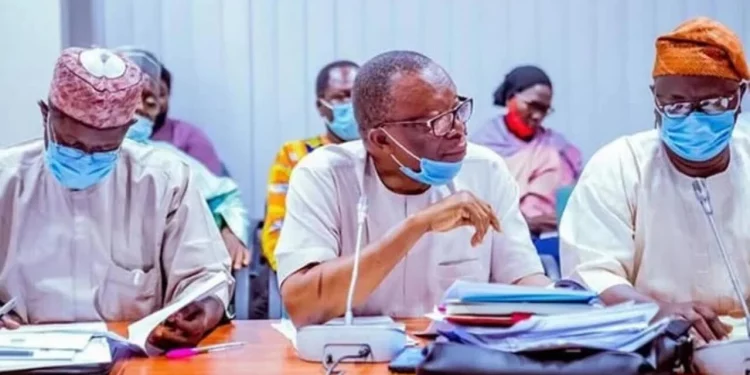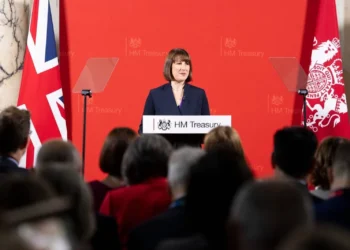The Federal Government has dragged the Academic Staff Union of Universities (ASUU) to the National Industrial Court over the union’s ongoing strike, which is in its seventh month now.
In a statement on Sunday, the Head of Press and Public Relations at the Ministry of Labour and Employment, Olajide Oshundun, said the Federal Government took the decision after dialogue between it and ASUU failed.
BASIC FACTS
- FG drags ASUU to industrial court following failure on negotiations with th university lecturers.
- FG says it wants the lecturers to return to the class immediately, even the matter is ongoing in court
- Government recently setup a committee to review it no work no pay policy that led to indefinite extension of the strike action by ASUU
WHAT WE KNOW
The Nigerian Federal Government has this Monday appeared in court against ASUU over the lingering dispute on the 2009 agreement entered by the government.
The government wants the National Industrial Court to order ASUU members to resume work, while the issues in dispute are being addressed by the court.
The referral instrument addressed to the Registrar of Industrial Court was dated September 8, 2022, and signed by the Minister of Labour and Employment, Senator Chris Ngige.
Also, the government wants the court to interpret in its entirety the provisions of Section 18 LFN 2004, especially as it applies to the cessation of the strike once a trade dispute is apprehended by the Minister of Labour and Employment and conciliation is ongoing.
The Federal Government also wants the court to determine the extent of ASUU’s demand since the 2020 Memorandum of Action (MOA) that the union signed with the government.
The demands include the funding for revitalisation of public universities as per the 2009 agreement, Earned Academic Allowances (EAA) payments, state universities proliferation and constitution of visitation panels and release of a white paper on the report of the visitation panels.
At the court this Monday, the Socio-economic Rights and Accountability Project (SERAP) sought to be joined in the suit as an interested party.
SERAP’s lawyer, Ebun-Olu Adegnoruwa (SAN) said his client had filed a similar suit to compel the Federal Government to honour its 2009 agreement with the striking lecturers.
He said SERAP’s request to join in the matter is based on the need to forestall the duplicity of outcomes concerning the industrial dispute. However, counsel to the Federal Government, Tijjani Gazali (SAN) opposes SERAP’s application to consolidate the suits.
He told the judge that SERAP’s application was premature as the case was billed for mention on Monday. Counsel to ASUU, Femi Falana, however, argued that he was aware of the efforts by lawyers to file court papers in the suit on Monday.
The judge ruled that the suit is not ripe for consolidation by SERAP. The judge said he was only presiding over the matter as a vacation judge and that the case would be assigned to another judge for adjudication.
He ordered the parties in the suit to file and exchange court documents as he adjourned the matter to Friday, 16 September 2022.
NOTABLE QUOTE
Other prayers made by the government to the court includes:
To “Interpret the provisions of Section 43 of the Trade Dispute Act, Cap T8. LFN 2004, titled “Special Provision with Respect to payment of wages during Strikes and Lock-outs,” specifically dealing with the rights of employees/workers during the period of any strike or lock-out. Can ASUU or any other union that embarked on strike be asking to be paid salaries even with clear provisions of the law?
“Determine whether ASUU members are entitled to emoluments or “strike pay” during their period of strike, which commenced on February 14, 2022, more so in view of our national law as provided in Section 43 of the TDA and the International Labour Principles on the right to strike as well as the decisions of the ILO Committee on Freedom of Association on the Subject.”
“Determine whether ASUU has the right to embark on strike over disputes as is the case in this instance by compelling the Federal Government to employ its own University Transparency Accountability Solution (UTAS) in the payment of the wages of its members as against the Integrated Payroll and Personnel Information System (IPPIS) universally used by the Federal Government in the nation for payment of wages of all her employees in the Federal Government Public Service of which university workers including ASUU members are part of or even where the government via NITDA subjected ASUU and their counterpart UPPPS university payment platform system software to integrity test (vulnerability and stress test) and they failed.”
CATCH-UP
Recall ASUU have been on strike for over six months now. Close to seven months actually without any end in sight yet.
Just last week, the government had given indication it was ready to shift grounds by setting up another committee to review no work no pay policy.
COMMENTARY
The Nigerian Federal Government has shown it is abysmally poor in crisis management.
In the first instance, this strike need not have happened.
The government entered an agreement in 2009. Have that agreement renegotiated 2013/2014, due for renegotiation in 2018/2019. The question is why did FG wait for the strike before doing what it ought to do?
The same IPPIS the government is holding unto has been proved unreliable. At the last meeting with ASUU, The FG confirmed that the University UTAS did better than IPPIS.
Just last week, the same government said over 54,000 false entries were uncovered in IPPIS. If this is the case, why is it still a subject of litigation?
Why did the government go to court without waiting for the outcome of it’s latest committee?
It does appear that the government is not only ill advised, but have little interest in settling this lingering crisis with ASUU












